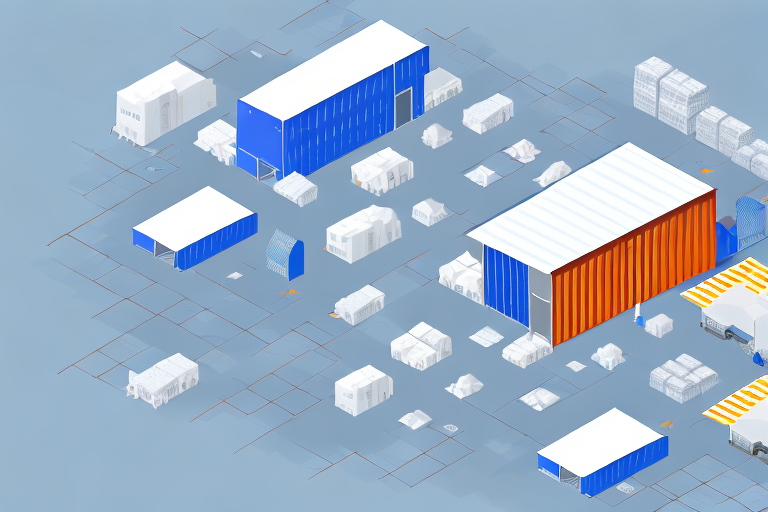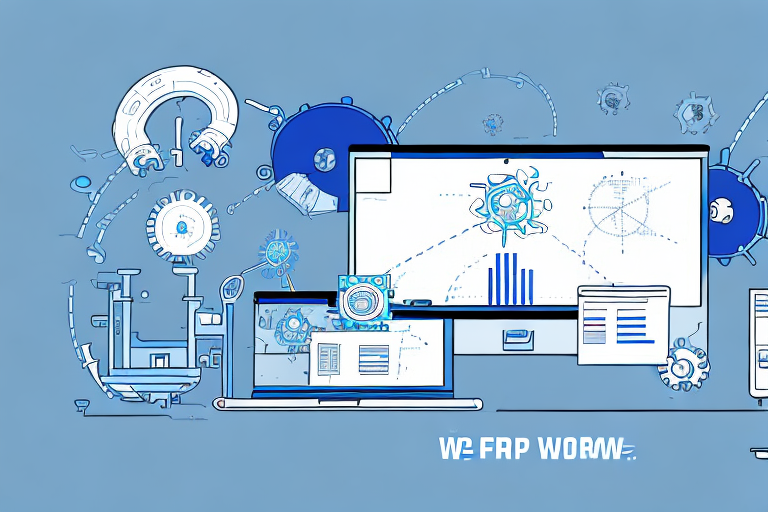Infor CloudSuite WMS vs SAP Extended Warehouse Management (EWM)
Warehouse management systems (WMS) have become increasingly vital as companies focus on efficient inventory management and order fulfillment. Two WMS solutions that have been gaining popularity over the years are Infor CloudSuite WMS and SAP Extended Warehouse Management (EWM). In this article, we'll delve deep into the features, functionalities, benefits, pricing, customer reviews, integration capabilities, customization options, implementation process, training requirements, technical support, and the final verdict of each solution.
Understanding Warehouse Management Systems
Warehouse management systems (WMS) are software applications designed to manage and optimize warehouse operations. According to a Gartner report, the global WMS market is expected to reach $5.7 billion by 2023, driven by the increasing complexity of supply chains and the need for improved inventory visibility.
WMS solutions streamline inventory management, order picking, replenishment, and shipping, making the process more efficient, accurate, and cost-effective. Essentially, WMS promotes better visibility and control over inventory management, reducing labor costs, improving order accuracy, and increasing customer satisfaction.
One of the key features of a warehouse management system is its ability to track inventory in real-time. This allows warehouse managers to monitor inventory levels and movements, making informed decisions about when to reorder products or move inventory to different locations within the warehouse. This helps prevent stockouts and overstocking, which can lead to lost sales and increased carrying costs.
Additionally, WMS can integrate with other systems, such as transportation management systems (TMS) and enterprise resource planning (ERP) systems. This integration facilitates a seamless flow of information between different departments and systems, reducing the risk of errors and delays in the supply chain.
Features and Functionalities of Infor CloudSuite WMS
Infor CloudSuite WMS is a cloud-based software solution that offers advanced warehouse operations, inventory, and labor management capabilities. Key features include:
- Real-time Inventory Visibility: Monitor inventory levels and order status in real-time, enabling proactive inventory management.
- Advanced Order Optimization and Wave Planning: Optimize order picking processes to enhance efficiency and reduce fulfillment times.
- Mobile App for Barcode Scanning and Data Collection: Empower warehouse staff with mobile devices for accurate and efficient data capture.
- Automated Replenishment and Putaway: Streamline the replenishment and storage of inventory to optimize warehouse space usage.
- Advanced Labor Management Tools: Track worker performance and manage schedules to maximize labor productivity.
- Customizable Reporting and Analytics: Access detailed reports and analytics to make data-driven decisions and enhance warehouse operations.
These features enable Infor CloudSuite WMS to improve warehouse efficiency, reduce labor costs, and enhance the overall customer experience. According to a Infor whitepaper, companies using their WMS have reported a 20% increase in order accuracy and a 15% reduction in labor costs.
Benefits of Implementing Infor CloudSuite WMS in Your Warehouse
- Improved Inventory Accuracy: Real-time inventory visibility reduces errors, minimizing the risk of stockouts and overstocking.
- Increased Productivity: Advanced labor management tools optimize schedules and performance, streamlining operations and enhancing productivity.
- Better Order Fulfillment: Enhanced order picking and shipping processes improve accuracy and reduce fulfillment times, leading to higher customer satisfaction.
- Scalability: As a cloud-based solution, Infor CloudSuite WMS can easily scale with your business growth, accommodating increased inventory and order volumes.
- Integration Capabilities: Seamlessly integrates with other enterprise systems, facilitating efficient data flow across the organization.
These benefits collectively contribute to a more efficient and cost-effective warehouse operation, ultimately driving better business performance.
Features and Functionalities of SAP Extended Warehouse Management (EWM)
SAP Extended Warehouse Management (EWM) is a comprehensive warehouse management system designed to streamline warehouse operations. It offers a robust set of features, including:
- Advanced Inventory Management: Real-time tracking of inventory levels and movements for precise inventory control.
- Optimized Order Picking and Fulfillment: Tools such as wave management and advanced shipping handling enhance order processing efficiency.
- Automated Putaway and Replenishment: Streamline storage and restocking processes to optimize warehouse space utilization.
- Advanced Labor Management: Task scheduling and performance tracking tools help maximize labor productivity.
- Customizable Reporting and Analytics: Access detailed insights and analytics for informed decision-making and continuous improvement.
- Integration with SAP Ecosystem: Seamlessly integrates with other SAP solutions, such as SAP ERP and SAP S/4HANA, offering a unified enterprise resource platform.
These features enable SAP EWM to enhance warehouse performance and productivity, supporting large-scale and complex warehouse operations. According to a SAP case study, companies using SAP EWM have reported a 25% increase in order processing speed and a 30% improvement in inventory accuracy.
Benefits of Implementing SAP Extended Warehouse Management (EWM) in Your Warehouse
- Enhanced Inventory Accuracy: Real-time inventory tracking minimizes errors, reducing the risk of stockouts and excess inventory.
- Increased Productivity: Advanced labor management tools optimize task scheduling and performance, enhancing overall productivity.
- Improved Order Fulfillment: Optimized order picking and shipping processes increase order accuracy and decrease fulfillment times.
- Scalability and Flexibility: SAP EWM supports large-scale operations and can adapt to evolving business needs.
- Comprehensive Integration: Integration with the SAP ecosystem provides a unified platform for managing diverse business processes.
These benefits lead to more efficient warehouse operations, cost savings, and improved customer satisfaction, making SAP EWM a valuable investment for businesses seeking robust warehouse management solutions.
Comparing Infor CloudSuite WMS and SAP Extended Warehouse Management (EWM)
To better understand which warehouse management system suits your business needs, let's compare Infor CloudSuite WMS and SAP Extended Warehouse Management (EWM) across various dimensions:
| Feature | Infor CloudSuite WMS | SAP Extended Warehouse Management (EWM) |
|---|---|---|
| Deployment | Cloud-based | On-premise or cloud-based |
| Inventory Management | Real-time visibility of inventory levels, advanced order optimization and wave planning, automated replenishment and putaway | Real-time tracking of inventory levels and movements, optimized order picking and fulfillment tools, automated putaway and replenishment capabilities |
| Labor Management | Advanced labor management tools, including performance tracking and scheduling | Advanced labor management tools, including task scheduling and performance tracking |
| Reporting and Analytics | Customizable reporting and analytics tools | Customizable reporting and analytics tools |
| Integration Capabilities | Integrates with other Infor solutions like Infor ERP | Integrates with other SAP solutions like SAP ERP and SAP S/4HANA |
| Pricing | Generally lower due to cloud-based deployment | Higher, especially for on-premise deployments |
| Scalability | Highly scalable with cloud infrastructure | Scalable with both on-premise and cloud options |
Both solutions offer comprehensive features and robust functionalities. Infor CloudSuite WMS is purely cloud-based, offering greater scalability and ease of deployment, which can be advantageous for businesses seeking flexibility. SAP EWM offers both on-premise and cloud options, making it suitable for organizations with specific deployment preferences or existing SAP infrastructure.
In terms of integration, Infor CloudSuite WMS seamlessly connects with other Infor products, whereas SAP EWM integrates naturally within the broader SAP ecosystem. This makes SAP EWM a better fit for businesses already utilizing SAP solutions.
Pricing Comparison Between Infor CloudSuite WMS and SAP Extended Warehouse Management (EWM)
The cost of implementing a warehouse management system can significantly impact your budget. Pricing for both Infor CloudSuite WMS and SAP Extended Warehouse Management (EWM) varies based on factors such as warehouse size, number of users, and required features.
- Infor CloudSuite WMS: As a cloud-based solution, Infor CloudSuite WMS typically offers subscription-based pricing, which can be more affordable upfront. Costs may include licensing fees, implementation services, and ongoing support. Businesses can benefit from lower capital expenditures and predictable operational costs.
- SAP Extended Warehouse Management (EWM): SAP EWM offers both on-premise and cloud-based pricing models. On-premise deployments generally require higher upfront costs for licenses and hardware, along with ongoing maintenance. Cloud-based deployments may offer subscription pricing similar to Infor, but overall costs are usually higher due to the comprehensive functionalities and integration capabilities.
According to a Gartner Magic Quadrant, Infor CloudSuite WMS is often cited as a cost-effective solution for mid-sized to large enterprises, while SAP EWM is recommended for larger organizations with complex warehouse operations and a need for deep integration with SAP ecosystems.
Both systems offer flexible pricing options tailored to meet the unique needs of different businesses. It's essential to conduct a detailed cost-benefit analysis to determine which system offers the best value based on your specific requirements and budget constraints.
Customer Reviews: What Users Are Saying About Infor CloudSuite WMS and SAP Extended Warehouse Management (EWM)
Customer feedback is invaluable when evaluating warehouse management systems. Below are some insights from users of Infor CloudSuite WMS and SAP Extended Warehouse Management (EWM):
Infor CloudSuite WMS
"Infor CloudSuite WMS has transformed our warehouse operations. We've seen a significant improvement in productivity and accuracy since implementing it." - John K., Warehouse Manager
"The reporting and analytics tools in Infor CloudSuite WMS have been a game-changer for us. We're now able to make data-driven decisions, helping us optimize our warehouse operations." - Sarah L., Operations Manager
A Capterra review highlights the intuitive user interface and strong customer support as major benefits, while some users mention the initial setup can be complex.
SAP Extended Warehouse Management (EWM)
"The advanced order picking tools in SAP Extended Warehouse Management (EWM) have helped us increase our order fulfillment rate significantly." - Dave M., Warehouse Supervisor
"We've been using SAP Extended Warehouse Management (EWM) for a few years now and have seen a significant improvement in inventory accuracy and labor productivity." - Alex G., Warehouse Manager
On Software Advice, SAP EWM is praised for its robust features and scalability, though some users point out the higher cost and complexity as potential drawbacks.
Integration Capabilities: How Infor CloudSuite WMS and SAP Extended Warehouse Management (EWM) Integrate with Other Systems
Integration capabilities are crucial for maximizing the effectiveness of a warehouse management system. Both Infor CloudSuite WMS and SAP Extended Warehouse Management (EWM) offer robust integration options:
- Infor CloudSuite WMS: Integrates seamlessly with other Infor solutions, such as Infor ERP, enhancing data flow and operational efficiency across enterprise functions. Additionally, Infor provides APIs and support for integrations with third-party systems, enabling businesses to tailor their IT ecosystem to specific needs.
- SAP Extended Warehouse Management (EWM): Designed to integrate flawlessly within the SAP ecosystem, including SAP ERP and SAP S/4HANA. This deep integration allows for real-time data synchronization, comprehensive reporting, and unified business processes. Moreover, SAP EWM supports integration with non-SAP systems through standard interfaces and APIs.
According to a Forrester report, seamless integration with existing systems not only reduces implementation time but also enhances data accuracy and operational visibility. SAP EWM’s integration with SAP's broader suite provides a unified platform for organizations heavily invested in SAP, while Infor CloudSuite WMS offers flexibility for businesses utilizing diverse software solutions.
Choosing the right WMS with strong integration capabilities ensures that your warehouse operations are coherent with other business processes, leading to improved overall efficiency and data-driven decision-making.
Customization Options: How Customizable Are Infor CloudSuite WMS and SAP Extended Warehouse Management (EWM)?
Customization is essential for businesses with unique warehouse requirements. Both Infor CloudSuite WMS and SAP Extended Warehouse Management (EWM) offer extensive customization options:
- Infor CloudSuite WMS: Allows users to customize workflows, dashboards, and reports to align with specific business processes. The platform also supports the development of custom modules and features using Infor's extensible framework, enabling businesses to tailor the system to their operational needs without extensive coding.
- SAP Extended Warehouse Management (EWM): Provides a highly customizable environment with advanced development tools. Users can modify standard functionalities, create custom transaction types, and integrate bespoke applications. SAP EWM also supports user exits and Business Add-Ins (BAdIs), allowing for complex customizations that meet specific enterprise requirements.
According to a CMSWire analysis, SAP EWM offers a more robust customization framework, making it suitable for large enterprises with complex and evolving warehouse processes. In contrast, Infor CloudSuite WMS provides sufficient flexibility for most mid-sized to large businesses, with an emphasis on ease of customization through its user-friendly interface.
Ultimately, the level of customization required should align with your business's operational complexity and the resources available for system development and maintenance.
Implementation Process: A Step-by-step Guide to Implementing Infor CloudSuite WMS or SAP Extended Warehouse Management (EWM)
Implementing a warehouse management system involves several critical steps to ensure a successful deployment. The implementation processes for both Infor CloudSuite WMS and SAP Extended Warehouse Management (EWM) typically include the following stages:
- Requirement Analysis: Assess your warehouse operations, identify specific needs, and define the scope of the project. Engage stakeholders to understand their requirements and establish clear objectives.
- System Configuration: Configure the WMS according to your business requirements. This includes setting up inventory parameters, defining workflows, and customizing reports.
- Data Migration: Transfer existing data from legacy systems to the new WMS. Ensure data accuracy and integrity during the migration process to avoid disruptions.
- Integration: Integrate the WMS with other enterprise systems, such as ERP and TMS. This step is crucial for seamless data flow across different business functions.
- Testing: Conduct thorough testing of the system to identify and resolve any issues. This includes unit testing, system testing, and user acceptance testing (UAT).
- Training: Provide comprehensive training to employees on how to use the new system. Training should be tailored to different user roles to ensure everyone is proficient with the WMS functionalities.
- Go-live: Launch the WMS and monitor its performance closely. Address any post-implementation issues promptly to ensure smooth operations.
- Post-Implementation Support: Provide ongoing support and maintenance to address any technical issues and implement system updates as needed.
According to a McKinsey report, effective project management, stakeholder engagement, and adequate training are critical factors for successful WMS implementation. Both Infor and SAP offer professional services and partner networks to assist with each step of the implementation process, ensuring that businesses can achieve a smooth transition to their new warehouse management systems.
Training Requirements: What Kind of Training is Needed for Employees to Use Infor CloudSuite WMS or SAP Extended Warehouse Management (EWM)?
Proper training is essential for ensuring that employees can effectively use the warehouse management system. Both Infor CloudSuite WMS and SAP Extended Warehouse Management (EWM) offer comprehensive training programs tailored to different user roles:
- Infor CloudSuite WMS:
- On-Demand Training: Access to a library of online courses and tutorials that employees can complete at their own pace.
- Classroom Training: Instructor-led training sessions, either in-person or virtual, covering various aspects of the WMS.
- Custom Training Options: Tailored training programs designed to meet the specific needs of your organization, ensuring that employees are proficient in the functionalities most relevant to their roles.
- SAP Extended Warehouse Management (EWM):
- Classroom Training: Comprehensive training sessions led by certified SAP instructors, covering system navigation, configuration, and advanced features.
- E-Learning: Online courses and modules that provide flexible learning options for employees.
- On-Site Training: Hands-on training conducted at your facility, allowing employees to learn the system in the context of your specific warehouse operations.
Effective training programs not only enhance user competence but also accelerate the adoption of the new system, minimizing disruptions and maximizing the benefits of the WMS. According to Training Magazine, organizations that invest in comprehensive training see a 30% increase in system utilization and a 25% reduction in operational errors post-implementation.
Both Infor and SAP provide extensive training resources, ensuring that your team is well-equipped to leverage the full potential of your chosen warehouse management system.
Technical Support: What Kind of Technical Support is Available for Infor CloudSuite WMS or SAP Extended Warehouse Management (EWM)?
Reliable technical support is crucial for resolving issues and maintaining system performance. Both Infor and SAP offer comprehensive technical support services for their respective warehouse management systems:
- Infor CloudSuite WMS:
- 24/7 Support: Round-the-clock access to technical support through phone, email, and online portals.
- Online Resources: Access to knowledge bases, user manuals, and community forums for self-service troubleshooting and information sharing.
- Dedicated Support Teams: Personalized support with account managers and dedicated technical teams to address specific needs and issues.
- SAP Extended Warehouse Management (EWM):
- 24/7 Support: Continuous technical support available via phone, email, and SAP’s support portal.
- SAP Support Portal: Comprehensive online resources, including documentation, knowledge articles, and user communities.
- Enterprise Support Packages: Enhanced support offerings that provide accelerated response times, proactive system monitoring, and personalized assistance.
According to a TechRepublic analysis, effective technical support can significantly reduce system downtime and enhance overall user satisfaction. Both Infor and SAP are recognized for their robust support infrastructures, ensuring that businesses can maintain seamless warehouse operations and quickly address any technical challenges that arise.
Additionally, both providers offer service level agreements (SLAs) that guarantee response times and resolution targets, providing peace of mind and reliability.
Final Verdict: Which Warehouse Management System is Right for Your Business?
Choosing the right warehouse management system is a strategic decision that can significantly impact your business operations and overall efficiency. Both Infor CloudSuite WMS and SAP Extended Warehouse Management (EWM) offer robust features and capabilities, but their suitability depends on your specific business needs and existing infrastructure.
- Choose Infor CloudSuite WMS if:
- You prefer a cloud-based solution with lower upfront costs and scalable infrastructure.
- You are a mid-sized to large enterprise seeking advanced inventory and labor management tools.
- Your organization utilizes other Infor solutions, enabling seamless integration and data flow.
- Choose SAP Extended Warehouse Management (EWM) if:
- You require a highly customizable solution that can handle complex and large-scale warehouse operations.
- Your business is deeply integrated with the SAP ecosystem, leveraging other SAP products like SAP ERP or SAP S/4HANA.
- You need both on-premise and cloud deployment options to suit your operational preferences.
Ultimately, it's essential to conduct a thorough needs assessment, consider your budget, evaluate the scalability and flexibility of each system, and consult with implementation partners to determine which WMS aligns best with your business objectives. Investing in the right warehouse management system can lead to improved operational efficiency, reduced costs, and enhanced customer satisfaction, driving your business towards sustained success.




















